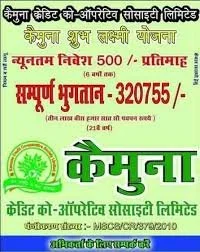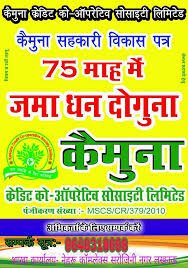Kamuna Credit Cooperative Society Limited sinks deeper into fraud accusations
— by Dr. Piyush Mathur —
It has been close to 3 months since Skand Shukla of the Hindi newspaper Dainik Jagran (October 5, 2020) reported the filing of several criminal cases in the Indian state of Uttarakhand against Mr. Pradeep Kumar Asthana, the managing director of a so-called Kamuna Credit Cooperative Society Limited (KCCSL). A limited liability multi-state credit cooperative society, KCCSL came into existence in 2010—and is headquartered in the Aliganj locality of Lucknow, Uttar Pradesh; it has been operating across many states, including Maharashtra, Bihar, Madhya Pradesh, and Himachal Pradesh.
Prakash Chand
The cases reported by Dainik Jagran had been filed in the small town of Lohaghat under sections 409 and 420 of the Indian Penal Code (IPC)—and under the Uttaranchal Protection of Interests of Depositors in Financial Establishments Act, 2005 (UPIDFEA). While the UPIDFEA is self-explanatory, the IPC Section 409 targets ‘criminal breach of trust by public servant, or by banker, merchant or agent’; and 420 frames ‘cheating and dishonesty inducing delivery of property’. But instead of getting these cases resolved somehow, KCCSL—bearing the registration MSCS/CR/379/2010—is only getting deeper into legal troubles.
The next legal front against KCCSL is all but opened up in Shimla—the cute capital of Himachal Pradesh—by one Mr. Prakash Chand. Hailing from a humble farming family of the district of Mandi, Mr. Chand has been living in Shimla for almost 10 years—working as a barista at Honey Hut. Anguished by the runaround that KCCSL had been giving him for several months over a fixed-deposit certificate, he finally sent out a legal notice on December 15, 2020 to its Lucknow headquarters through Mr. Vijay Sharma, a Shimla-based lawyer; a copy each of this notice was simultaneously sent to the society’s Shimla and Mandi branches.
Chand’s notice threatens KCCSL with legal action unless it delivers to him within 15 days his long overdue sum of INR 60, 000 along with all due interest as well as legal costs that he has so far incurred. As we enter AD 2021, it is all but clear that KCCSL is in no hurry to act positively in response to Mr. Chand’s notice—and that he might have to pursue his case in a court of law (unless some sort of an out-of-court settlement ultimately comes to pass).
Either way, KCCSL can expect in short order at least seven similar legal notices from Mr. Chand’s as many acquaintances—who all claim to have been victimised, quite like him, by this outfit (and they may also narrate their experiences soon to Thoughtfox). Mr. Chand’s tiny legal step thus has all the potential to expand into a much wider legal action and, quite possibly, a criminal inquiry to be pursued by Himachal police (along the lines of the one being pursued by Lohaghat police in Uttarakhand).
TRACKER: Kamuna Credit Cooperative Society scam
On this page, Thoughtfox.xyz curates all the updates on ongoing challenges—legal and political—to the notoriously fraudulent Kamuna Credit Cooperative Society (KCCS) of India.
And yet, there is enough reason to fear that Mr. Chand might not be able to retrieve his money from KCCSL anytime soon, if ever at all, unless the political leaders of the Himachal Pradesh government intervene into this evolving scandal quite directly—and ensure a quick and corruption-free disbursal of compensation to all the victims of this outfit inside the state. As to why political and executive interference might be necessary has to do with the fact that India’s regulatory mechanism regarding these societies is, all said and done, confused—and it is quintessentially a story of neglect of those on the margins of the country’s financial and educational systems.
Even the current law aimed at improving the situation of these societies is arduous—as it leaves it to the Central Registrar of Co-operative Societies to appoint an arbitrator to resolve a dispute of the kind that Mr. Chand and similar victims claim to have with KCCSL. At the same time, the availability of such a provision to such a society’s nominal member (which Mr. Chand is, by default) is not immediately clear from the language of the law—which does not distinguish, at precisely this level of its reference, between a nominal and a shareholding member (or for that matter, between an individual and an institutional member). Moreover, the law prohibits an arbitrator’s judgment—including regarding the sheer admissibility of a dispute (and its relevant classification)—from being challenged in a court of law (or elsewhere).
A relatively recent law—the Banking Regulation Amendment Act, 2020—is only a step backward, as far as victims of such societies’ laxity are concerned. This Amendment—otherwise supposed to improve the situation of India’s beleaguered cooperative sector—categorically leaves out precisely the kind of organization that KCCSL is. Unfortunately, it is these types of societies among other cooperative organizations of India that have the reputation among the educated classes anyway to be the sickest. At any rate, a recently updated list indicates that there are as many as 49 multi-state co-operative societies in India that are undergoing liquidation; while KCCSL is not yet on that list, it won’t be a big surprise if it comes to be added to it in the coming year.
Quite obviously, all of that sets up a stage for some type of an external intervention from the get-go—say, in who gets to be picked by the Central Registrar as the arbitrator; whether a dispute is fit to be classified as what type (‘constitution, management or business’); and, for that matter, whether a nominal member with a paltry fixed deposit deserves the individual attention of the Central Registrar, leave aside an independent arbitrator. And we haven’t even made a mention yet of the prospect of repayments! But as far as a nominal member with unpaid dues from such a society is concerned, of course she would try every trick in the book and beyond to retrieve what is well over her due—and she may in fact score a point or two.
A small sample of KCCL’s misleading online advertisements in Hindi
The advertisement states the following: Kamua Group Lakshmi Declaration / Minimum investment: Rs. 500 monthly / Full investment: Rs. 3, 20, 755; Kamuna Credit Cooperative Society Limited
The advertisement states the following: Kamuna Cooperative Development Certificate, Deposited sum doubles in 75 months
The first line in the above advertisement states the following: You no longer need luck in order to become a millionaire!
Take the case, for instance, of one Mr. Arun Ganpat Karale, who was (at the time) a resident of Yashodhan Nagar in Thane, Maharashtra. The Financial Express (January 18, 2015) reported that (presumably in 2014), Mr. Karale took a grievance (very similar to Mr. Chand’s) against Sukh Shanti Co-operative Credit Society Limited (SSCCSL) to Thane District Consumer Complaint Redressal Forum (TDCCRF). He had to do that because an externally appointed administrator (or arbitrator) had refused to return him his overdue deposits and interest citing a lack of authority as well as responsibility on his part regarding the same. But the TDCCRF ordered the society and the arbitrator to fully meet Mr. Karale’s claims (even as we are left to assume, based upon how the country works, that Mr. Karale might not have been able to pull this off with this consumers’ forum without some level of a rapport with the local powerbrokers associated with it to some extent).
A quick sketch of Mr. Prakash Chand’s struggle against KCCSL
Mr. Chand’s legal notice points out that he had invested INR 30, 000 on a KCCSL-issued fixed deposit certificate on July 31, 2013. This certificate matured on June 1, 2020; and it was supposed to get him INR 60, 000 on that date—except that no payment whatsoever has been made back to him even as of today. Instead, he has spent many an hour calling up and visiting anybody and everybody who he thought might help him to get his money back—and that is aside from the time and money he has had to spend on transportation to and fro KCCSL’s office in Mandi (as well as the Shimla branch, for that matter).
None of the above has been easy to do for Mr. Chand—given that he resides in the pricey tourist capital of an Indian hill state, and holds a full-time (no weekend off) job that pays him around Rs. 15, 000 per month. In that amount—coupled with a small agricultural income—he supports not only himself but also his spouse, a small child, and other family members back in his village. For people in his shoes, there is no time, interest, or educational background to deal with the underlying details of a botched fixed deposit certificate with a quasi-banking agency. And yet, against all odds, he has taken a step beyond the ordinary already by sending out his legal notice; but unlike Mr. Neeraj Verma—whose anti-KCCSL police complaint is the subject of the Dainik Jagran report mentioned at the start of this report—he has had no luck so far with his state’s police.
When, hoping to file a case against KCCSL, Mr. Chand took his grievance in September 2020 to Mandi’s Police Station Sadar, the officer in charge declined to register his complaint—under the false pretext that he had no case yet given that the KCCSL had been maintaining that he would get his money back. In point of fact, the KCCSL had already repeatedly lapsed (for over 3 months) in its promise—enshrined in the fixed deposit certificate that it had issued—to Mr. Chand (and others he knows in the area). Leave that aside, a registered police complaint—even if short of a First Information Report—would have been a way for the police to ascertain through a preliminary inquiry whether a criminal case exists against KCCSL (nor would an FIR itself have been unprecedented anyway—as similar FIRs have been filed before, such as by the Shankarapuram police, in March 2020, against Sri Guru Sarvabhowma Souharda Credit Cooperative Limited).
But it gets worse. When, earlier in 2020, a well-wisher of Mr. Chand phoned, in his behalf, a reputed female reporter with the Chandigarh-based Tribune, then—in a shocking contrast from her social-justice oriented journalism—the reporter remained rudely dismissive until the well-wisher used some sycophancy. At that point, the reporter gave the well-wisher the phone number of a Shimla-based male reporter of the same newspaper. But this male journalist, Mr. Chand’s well-wisher tells Thoughtfox on the condition of anonymity— insultingly mimicked, over the phone, the well-wisher’s manner of speaking! Apparently, India’s Anglophone reporters exercise professional communication and civility only when the person on the other side is somebody they know to be rich and powerful.
The road ahead for Mr. Chand and other victims of KCCL’s failings
As of January 01, 2021, KCCL has a Facebook page with its last wall post dating to June 7, 2016; this page could be accessed here. Well, KCCL’s victims and their sympathizers have also launched a group page of their own, and that could be accessed here. With the help of their well-wishers, Mr. Chand and other area victims of KCCL’s failings hope to pursue their case not only through legal means and via social media, but also by meeting their local political representatives and by filing complaints on the Himachal Pradesh Chief Minister Helpline and on the Prime Minister Helpline. A complaint is also expected to be sent out to the Central Registrar of Co-operative Societies.
A retired senior executive from the Reserve Bank of India told Thoughtfox that in a case like Mr. Chand’s, a civil lawsuit should itself suffice—as the court would likely order KCCL to repay the dues to Mr. Chand. Based on the court’s decree, he added, the plaintiff could file an execution petition and recover the money; however, if KCCL has run out of money, then the plaintiff may file a petition to liquidate the society. This liquidation, it is presumed, might lead to a partial or full recovery of funds from KCCL for Mr. Chand and the like.
However, we know from other similar cases that hardly anything moves in India in the right direction without some local involvement from people and politicians. For instance, what if Mr. Chand and others are, in the best-case legal scenario, made to satisfy themselves with only a partial payment via liquidation? For any remaining amounts, they would yet have to seek the support of their political representatives and communities; and quite possibly, they won’t mind going the way of Mr. Karale of Thane—and pile pressure on KCCL executives via local consumer fora.
One should also keep in mind that KCCL has left quite a wreckage behind already. Far prior to the October 5, 2020 report by Dainik Jagran, we had this video report in Hindi filed in December 2019 from Bageshwar, Uttarakhand—by Suresh Pandey for CCN News—on an early phase of this evolving scandal. Then, in March 2020, Manish Shrivastava and his colleague at the studio put out a report from Lucknow on this issue for the Hindi television channel News India 24x7 Live: Even at that time, this report had claimed a scandal running into millions of rupees—presumably across half the states of India—and it had already declared that only police action might push KCCL executives into remedying the situation.
But here we are into the first week of 2021, and witnessing KCCL tragedy slowly turning into a farce. Maybe Himachal authorities would finally take note—and thus a national lead in providing justice to KCCL’s victims. Mr. Chand and his fellow victims can only hope!
Selected external references:
Financial Express: https://www.financialexpress.com/industry/banking-finance/credit-society-told-to-pay-rs-1-lakh-compensation-to-depositor/31585/
Hindu: https://www.thehindu.com/news/national/karnataka/fir-against-co-operative-bank-for-not-returning-fd-amount-to-customer/article31053192.ece
Indian Kanoon: https://indiankanoon.org/doc/1123621/
Suresh Pandey: CCN News, Bageshwar: December 22, 2019 December 27, 2019
Dr. Piyush Mathur has previously published in Asia Times Online (Hong Kong & Bangkok) and Himal Southasian (Nepal), among many other outlets. You may contact him by clicking on his name above.




